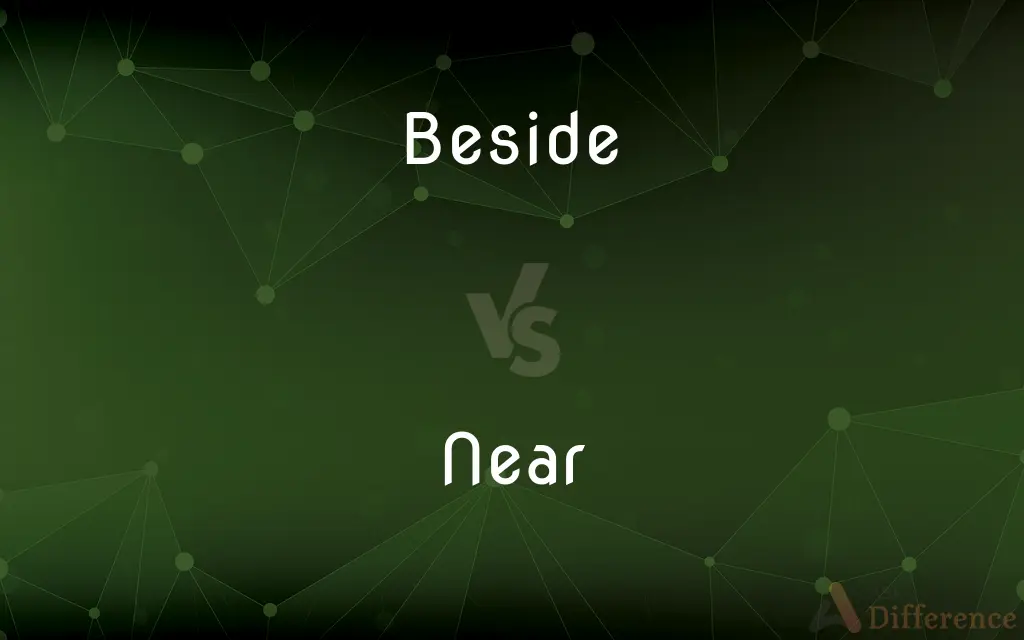Beside vs. Near — What's the Difference?
By Maham Liaqat & Urooj Arif — Updated on March 26, 2024
"Beside" refers to being next to something, indicating direct adjacency. "Near" suggests proximity but not necessarily direct contact.

Difference Between Beside and Near
Table of Contents
ADVERTISEMENT
Key Differences
Beside is a preposition used to denote being at the side of something or someone, implying a very close and specific positional relationship. For example, when you say a book is beside a lamp on a table, it means the book is directly next to the lamp. Near, on the other hand, is more about general proximity and does not specify an exact position. Saying a park is near your house suggests it is close in distance but does not indicate that it is directly adjacent to your house.
The use of "beside" can also connote a comparison or contrast, though this is a less common usage compared to its primary meaning of physical adjacency. For example, in literature, one might find phrases like "beside her intelligence, his seemed dim," using "beside" to compare two qualities. Near does not have this connotative flexibility and is primarily concerned with spatial or sometimes temporal proximity without implying comparison.
In terms of spatial relationships, "beside" implies a level of precision and immediacy in placement that "near" does not. For instance, if you are instructed to sit beside someone, it is clear that you should sit directly next to them. If you are told to sit near someone, you have a bit more flexibility in choosing a spot that is close to, but not necessarily right next to, that person.
Both "beside" and "near" are useful for describing locations and distances, but "beside" is the choice when the intent is to communicate direct adjacency. In contrast, "near" is preferable for indicating that something is simply within a short distance or close by, without specifying whether it is directly adjacent, making it a more flexible but less precise term.
When giving directions or describing the location of objects relative to one another, the choice between "beside" and "near" can significantly impact the clarity of the instruction or description. For precise directions within a small area or room, "beside" might be more useful. For broader directions or when precision is less critical, "near" could be the better choice, providing a sense of proximity without the need for immediate adjacency.
ADVERTISEMENT
Comparison Chart
Definition
At the side of; next to
Close to but not necessarily touching
Spatial Precision
High (direct adjacency)
Lower (general proximity)
Connotation
Direct adjacency or comparison
General proximity without direct contact
Usage Context
Used for specific positioning
Used for indicating closeness
Flexibility
Less flexible, implies direct side-by-side placement
More flexible, encompasses a broader area of proximity
Compare with Definitions
Beside
Direct adjacency.
The pencil lay beside the notebook, indicating it was right next to it.
Near
Less precision in placement.
We parked near the stadium, but it took a while to find the entrance.
Beside
Comparison context.
Beside his cheerful demeanor, her mood seemed quite somber.
Near
Broader area of closeness.
Living near the park offers easy access to outdoor activities.
Beside
Literal placement.
Place the vase beside the photograph for a balanced arrangement.
Near
Temporal or spatial closeness.
The deadline is near, urging a sense of urgency.
Beside
Specific positioning.
Parking beside the entrance can save time for quick visits.
Near
Flexibility in distance.
Find a spot near the window for better lighting.
Beside
Immediate proximity.
She sat beside me during the concert, sharing the experience closely.
Near
General proximity.
The coffee shop is near the library, making it a convenient meeting spot.
Beside
At the side of; next to
The table beside the bed
He sat beside me in the front seat
Near
To, at, or within a short distance or interval in space or time
Moved the table nearer to the wall.
As graduation draws near.
Beside
In addition to; apart from
He commissioned work from other artists beside Minton
Near
Just about; almost; nearly
Was near exhausted from the climb.
Beside
At the side of; next to.
Near
With or in a close relationship
It turns out we are near related.
Beside
In comparison with
A proposal that seems quite reasonable beside the others.
Near
Close in time, space, position, or degree
Near neighbors.
Near equals.
Beside
On an equal footing with
Has earned a place beside the best performers in the business.
Near
Closely related by kinship or association; intimate
A near relative.
A near and dear friend.
Beside
In addition to
"Many creatures beside man live in communities" (Stuart Chase). See Usage Note at besides.
Near
Nearly occurring but not actually happening
A near victory.
A near disaster.
Beside
Except for. See Usage Note at besides.
Near
Just barely avoided
A near hit by the incendiary bomb.
Beside
Not relevant to
A remark that was beside the point.
Near
Closely corresponding to or resembling an original
A near likeness.
Beside
In addition.
Near
Closely resembling the genuine article
A dress of near satin.
Near silver beads.
Beside
Nearby.
Near
Closer of two or more
Take the near street and then turn right.
Beside
Next to; at the side of.
A small table beside the bed
Near
Being on the left side of an animal or vehicle.
Beside
Not relevant to.
That is beside the point
Near
Being the animal or vehicle on the left.
Beside
Besides; in addition.
Near
Short and direct
The nearest route to town.
Beside
Otherwise; else; besides.
Near
(Archaic) Stingy; parsimonious.
Beside
At the side of; on one side of.
Near
Close to
An inn near London.
Beside
Aside from; out of the regular course or order of; in a state of deviation from; out of.
[You] have done enoughTo put him quite beside his patience.
Near
To come close or closer to
The plane neared the terminal.
Beside
Over and above; distinct from; in addition to.
Wise and learned men beside those whose names are in the Christian records.
Paul, thou art beside thyself.
Lovely Thais sits beside thee.
Only be patient till we have appeasedThe multitude, beside themselves with fear.
It is beside my present business to enlarge on this speculation.
Besides this, there are persons in certain situations who are expected to be charitable.
And, besides, the MoorMay unfold me to him; there stand I in much peril.
That man that does not know those things which are of necessity for him to know is but an ignorant man, whatever he may know besides.
Near
To draw near or nearer; approach
As the holiday nears.
Near
Physically close.
I can't see near objects very clearly without my glasses.
Stay near at all times.
Near
Close in time.
The end is near.
Near
Closely connected or related.
The deceased man had no near relatives.
Near
Close to one's interests, affection, etc.; intimate; dear.
A matter of near consequence to me.
A near friend
Near
Close to anything followed or imitated; not free, loose, or rambling.
A version near to the original
Near
So as barely to avoid or pass injury or loss; close; narrow.
A near escape
Near
Approximate, almost.
The two words are near synonyms.
Near
On the side nearest to the kerb (the left-hand side if one drives on the left).
The near front wheel came loose.
Near
(dated) Next to the driver, when he is on foot; (US) on the left of an animal or a team.
The near ox; the near leg
Near
(obsolete) Immediate; direct; close; short.
Near
Stingy; parsimonious.
Don't be near with your pocketbook.
Near
Within the currently selected segment in a segmented memory architecture.
A near pointer
Near
At or towards a position close in space or time. en
Near
Nearly; almost.
He was near unconscious when I found him.
I jumped into the near-freezing water.
I near ruptured myself trying to move the piano.
Near
Physically close to, in close proximity to.
There are habitable planets orbiting many of the stars near our Sun.
Near
Close to in time.
The voyage was near completion.
Near
Close to in nature or degree.
His opinions are near the limit of what is acceptable.
Near
(ambitransitive) To come closer to; to approach.
The ship nears the land.
Near
The left side of a horse or of a team of horses pulling a carriage etc.
Off side
Near
At a little distance, in place, time, manner, or degree; not remote; nigh.
My wife! my traitress! let her not come near me.
Near
Nearly; almost; well-nigh.
Near about the yearly value of the land.
Near
Closely; intimately.
Near
Not far distant in time, place, or degree; not remote; close at hand; adjacent; neighboring; nigh.
He served great Hector, and was ever near,Not with his trumpet only, but his spear.
Near
Closely connected or related.
She is thy father's near kinswoman.
Near
Close to one's interests, affection, etc.; touching, or affecting intimately; intimate; dear; as, a near friend.
Near
Close to anything followed or imitated; not free, loose, or rambling; as, a version near to the original.
Near
So as barely to avoid or pass injury or loss; close; narrow{3}; as, a near escape; a near miss.
Near
Immediate; direct; close; short.
Near
Close-fisted; parsimonious.
Near
To approach; to come nearer; as, the ship neared the land.
Near
To draw near; to approach.
A speck, a mist, a shape, I wist!And still it neared, and neared.
Near
Move towards;
We were approaching our destination
They are drawing near
The enemy army came nearer and nearer
Near
Not far distant in time or space or degree or circumstances;
Near neighbors
In the near future
They are near equals
His nearest approach to success
A very near thing
A near hit by the bomb
She was near tears
She was close to tears
Had a close call
Near
Being on the left side;
The near or nigh horse is the one on the left
The animal's left side is its near or nigh side
Near
Closely resembling the genuine article;
Near beer
A dress of near satin
Near
Giving or spending with reluctance;
Our cheeseparing administration
Very close (or near) with his money
A penny-pinching miserly old man
Near
With or in a close or intimate relationship;
A good friend
My sisters and brothers are near and dear
Near
Very close in resemblance;
Sketched in an approximate likeness
A near likeness
Near
Near in time or place or relationship;
As the wedding day drew near
Stood near the door
Don't shoot until they come near
Getting near to the true explanation
Her mother is always near
The end draws nigh
The bullet didn't come close
Don't get too close to the fire
Near
(of actions or states) slightly short of or not quite accomplished; `near' is sometimes used informally for `nearly' and `most' is sometimes used informally for `almost';
The job is (just) about done
The baby was almost asleep when the alarm sounded
We're almost finished
The car all but ran her down
He nearly fainted
Talked for nigh onto 2 hours
The recording is well-nigh perfect
Virtually all the parties signed the contract
I was near exhausted by the run
Most everyone agrees
Common Curiosities
Can "near" and "beside" be used interchangeably?
While both suggest proximity, they are not always interchangeable due to "beside" implying direct adjacency and "near" indicating a more general closeness.
What does "beside" indicate in a sentence?
"Beside" indicates a specific position directly next to or at the side of something or someone.
Can "near" imply emotional closeness?
Yes, "near" can imply emotional closeness in a metaphorical sense, not just physical proximity.
Is "near" more flexible than "beside"?
Yes, "near" is more flexible, indicating proximity without specifying exact adjacency.
When is it appropriate to use "near"?
Use "near" when you want to convey that something is close by but not necessarily directly adjacent.
When should I use "beside"?
Use "beside" when you want to emphasize that something is right next to another thing.
How does "beside" differ from "besides"?
"Beside" denotes physical location, while "besides" means "in addition to" or "apart from."
Can "near" relate to time as well as space?
Yes, "near" can indicate closeness in time (e.g., "the time is near") as well as in space.
How do "beside" and "near" compare in terms of precision?
"Beside" is more precise, denoting direct side-by-side placement, while "near" is less precise, allowing for a broader interpretation of proximity.
Does "beside" have a metaphorical usage?
Yes, "beside" can be used metaphorically to denote comparison or contrast.
Share Your Discovery

Previous Comparison
Morula vs. Mulberry
Next Comparison
Upward vs. UpwardsAuthor Spotlight
Written by
Maham LiaqatCo-written by
Urooj ArifUrooj is a skilled content writer at Ask Difference, known for her exceptional ability to simplify complex topics into engaging and informative content. With a passion for research and a flair for clear, concise writing, she consistently delivers articles that resonate with our diverse audience.














































